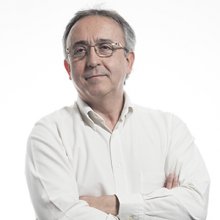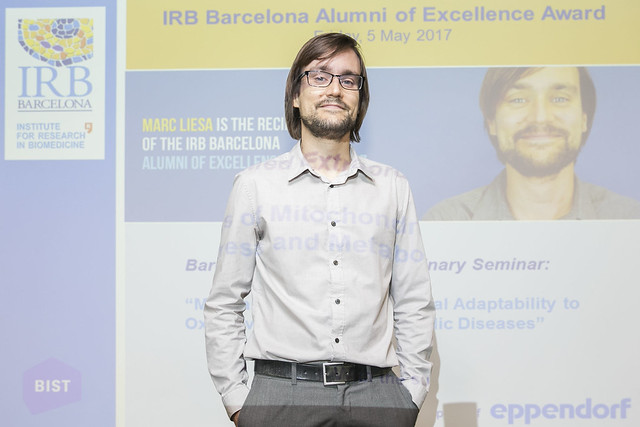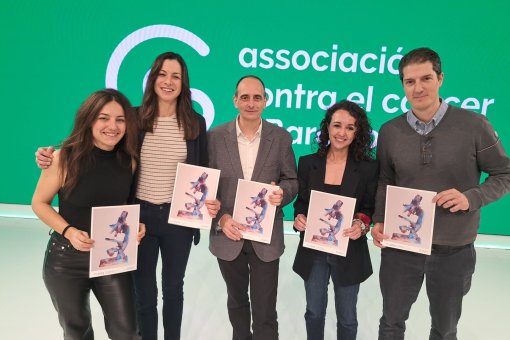Images
Participants


Contact

Marc Liesa received his PhD in 2008 after completing his doctoral studies in Antonio Zorzano's Complex Metabolic Diseases and Mitochondria Laboratory.
This award recognises the excellence of former IRB Barcelona scientists.
The jury for the prize acknowledges Marc Liesa’s important contributions to mitochondrial biology.
IRB Barcelona alumnus Marc Liesa, Assistant Professor in-residence of the Department of Medicine at the University of California, Los Angeles (UCLA) David Geffen School of Medicine, has been presented the 2017 IRB Barcelona Alumni of Excellence Award. The jury for the prize—formed by senior IRB Barcelona researchers with expertise in several fields—acknowledges “his important contributions to mitochondrial biology, in particular the study of the functional relationships between organelle morphology and cellular energetics, and the identification of ABCB10 as the first mitochondrial ATP binding cassette transporter essential in heme-mediated oxidative stress protection”.
This is the second year of the Alumni Award—a prize given in recognition of outstanding contributions to science and the scientific community by young researchers who completed a significant part of their training and careers at IRB Barcelona. David Vilchez, group leader at the CECAD-Cluster of Excellence in Cologne (Germany), received the award in 2016.
"It is gratifying to recognise the merit of scientists trained at IRB Barcelona that are pursuing careers in other centres of excellence around the world. One of our missions is to provide exceptional training for young people, and I confess that my greatest satisfaction would be a student of mine winning the Nobel Prize," states the director of the IRB Barcelona, Joan J. Guinovart.
Marc Liesa’s Career
Marc Liesa obtained his PhD in 2008 at IRB Barcelona, where he studied in Antonio Zorzano's Complex Metabolic Diseases and Mitochondria Laboratory. In 2009, he moved to the US to undertake a 4-year postdoctoral training period at the Boston University School of Medicine. In 2013, he held his first faculty position as an Instructor in Medicine, followed by an appointment as Assistant Professor at the same institution in Boston. In 2015, he was appointed Assistant Professor in-residence at the Department of Medicine, David Geffen School of Medicine at UCLA, leading his own research group.
He is currently Co-director of the new Metabolism Center at UCLA, together with scientists David Shackelford, Karen Reue and Orian Shirihai. UCLA (est. 1919) is ranked No. 10 in the world in the 2017 U.S. News and World Report and the No. 2 public institution in the United States. It is the birthplace of the internet and 7 UCLA faculty members were awarded Nobel Prizes: 4 in Chemistry, 1 in Physics, 1 in Economic sciences and 1 in Physiology/Medicine.
In addition to his academic activity at UCLA, Marc Liesa is a PhD Committee member of 4 students at the Nutrition Programme at Boston University. He has also been invited to Harvard Medical School (Boston, USA) and Weizmann Institute of Science (Rehovot, Israel) to give workshops on methodologies to determine mitochondrial function. He collaborated with 21 different laboratories in academia, holds sponsored research agreements with industry and published 39 articles in internationally peer-reviewed journals. He has a high citation index (h-23, Google Scholar) and serves as a reviewer for various scientific journals, including Circulation and Molecular Metabolism. He is an Academic Editor at the scientific journal PLOS One as well.
Marc Liesa’s research has contributed to determining novel and essential mechanisms of mitochondrial adaptation to health and disease. He seeks to use these mechanisms as biomarkers to discern an adaptive versus a pathogenic/decompensated decline in mitochondrial function. His long-standing goal is to use these biomarkers to manipulate mitochondria and treat metabolic diseases.
Supported by Eppendorf, the IRB Barcelona Alumni of Excellence Award consists of a commemorative certificate, a prize of 2,000 €, and an expenses-paid trip to IRB Barcelona to give a plenary talk in the Barcelona Biomed seminar series.
View the Album of the Alumni of Excellence Award Ceremony 2017
About IRB Barcelona
Founded in 2005 by the Government of Catalonia and the University of Barcelona, the Institute for Research in Biomedicine (IRB Barcelona) is “Severo Ochoa Centre of Excellence”, since 2011; the seal was renewed in 2015. The 23 groups and seven scientific platforms are devoted to basic and applied research with the common goal of conducting multidisciplinary projects that address important biomedical problems affecting our society, with special emphasis on cancer, metastasis, Alzheimer, diabetes and rare diseases. The institute is home to more than 400 employees from 36 countries. IRB Barcelona's ultimate objective is to translate research results to the clinic and has already established three biotechnology spin-off companies to this end. IRB Barcelona is located at the Barcelona Science Park. IRB Barcelona is part of the Barcelona Institute of Science and Technology (BIST).
About IRB Barcelona
The Institute for Research in Biomedicine (IRB Barcelona) pursues a society free of disease. To this end, it conducts multidisciplinary research of excellence to cure cancer and other diseases linked to ageing. It establishes technology transfer agreements with the pharmaceutical industry and major hospitals to bring research results closer to society, and organises a range of science outreach activities to engage the public in an open dialogue. IRB Barcelona is an international centre that hosts 400 researchers and more than 30 nationalities. Recognised as a Severo Ochoa Centre of Excellence since 2011, IRB Barcelona is a CERCA centre and member of the Barcelona Institute of Science and Technology (BIST).





